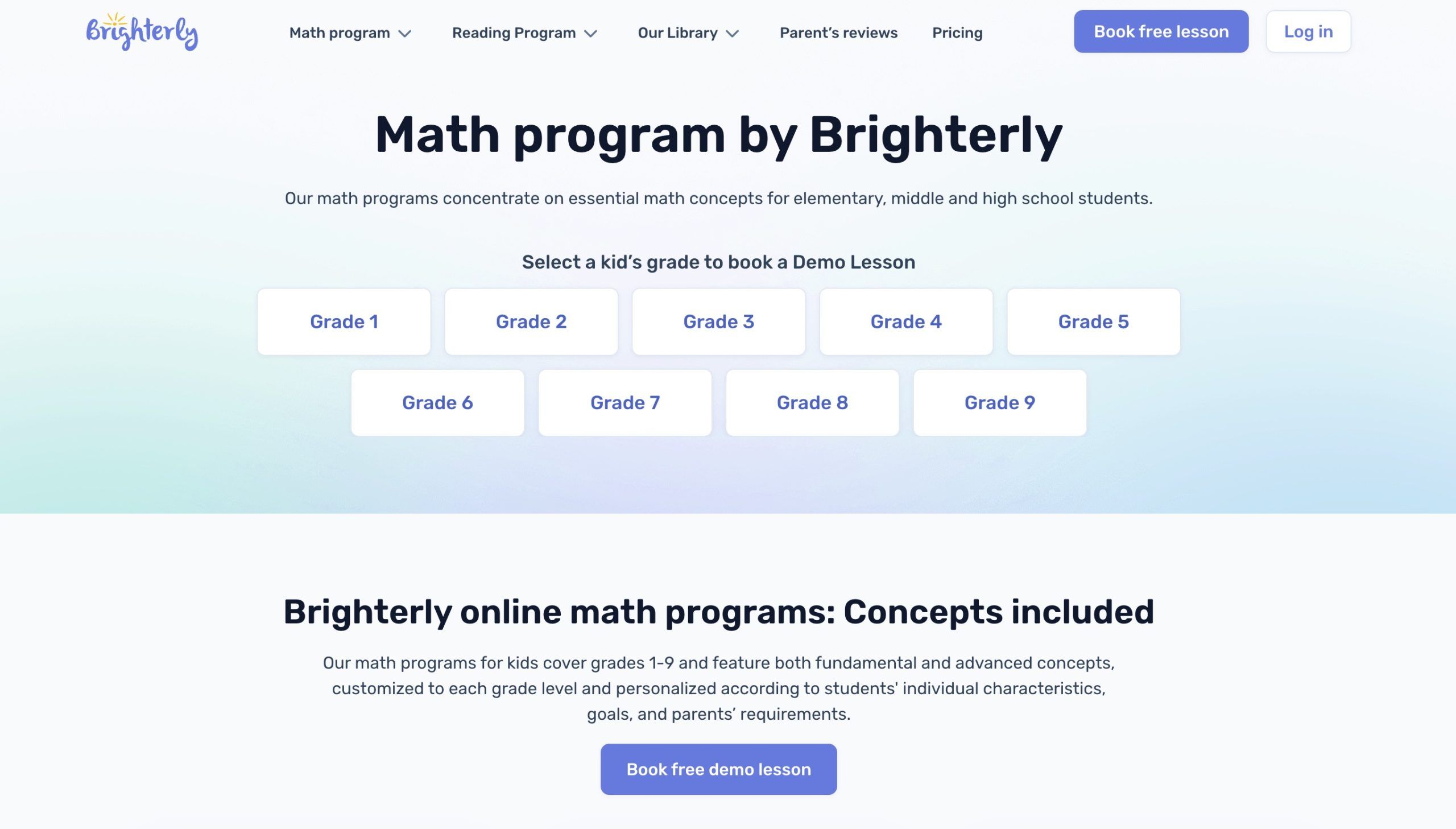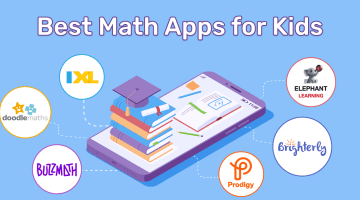What is Mental Math and Why is It Important for Children?
reviewed by Janice S. Armas
Updated on January 26, 2026
Parents often use strategies like games and worksheets to help children understand math. While it’s extremely helpful, practical skills like mental math can sometimes go overlooked. Mental math is a powerful add-on to your child’s math abilities, and today I will help you understand what is mental math, and why your child absolutely needs it.
Key points
- Mental math is a skill that allows kids to solve mathematical problems in their minds without using external tools like pencils, paper, or calculators.
- Many parents underestimate the importance of mental math, not putting enough emphasis on it during their at-home studies.
- Avoiding mental math can lead to a lack of confidence, math anxiety, and fear of making mistakes.
- Online educational platforms like Brighterly recognize the importance of an adapted approach when teaching mental math to children.
What is mental math?
Mental math is a skill that allows kids to solve mathematical problems in their minds without using external tools like pencils, paper, or calculators. When kids start manipulating numbers and finding out solutions in their heads, it means they are using mind math.
Note: Interestingly, we use mental math in our everyday life without realizing it. Mental math examples are estimating travel time, telling and predicting time, how many chores to do in a day, counting money, and more.
Parents sometimes downplay the importance of mental math, expecting their kids to build this crucial skill on their own. Unjustly so! It is vital to encourage children develop this skill early, so they won’t rely on calculators each step of the way.
Is mental math difficult?
Mental math is not inherently difficult. Kids often think it’s difficult because it requires holding numbers in mind and operating them quickly. That can feel uncomfortable at first, but in math, everything does. Some parents, when tutoring, rely too much on written steps or even calculators. While it may be helpful at first, moving to counting mentally is necessary.
Note: Avoiding mental math during lessons can lead to a lack of confidence, math anxiety, and fear of making mistakes. As a result, kids can develop serious math loss in the future.
Mental arithmetic’s difficulty for kids depends on lots of factors. Naturally, mental calculations at first are challenging for everybody. Even for tutors! But, as children grow and their thinking evolves, mental mathematics becomes more intuitive.
When children struggle with mental math, it doesn’t necessarily mean they don’t have talent for math or they’re not smart. And the truth is, everybody is different and develops skills at their own pace.
Online educational resources like Brighterly math and reading platform recognize the importance of an adapted approach when teaching mental math skills for children. These programs support children through 1-on-1 personalized support that is adapted to students’ personal pace and rhythms. With such approaches, kids could catch up more quickly and with minimal stress.
Experiencing troubles with mental math may be a sign your kid needs qualified support. Math tutors from Brighterly adjust lesson plans based on students’ personalized knowledge gaps and help them recover from that loss effectively.
For example, for mental math, they slowly stir children towards mental arithmetic without relying heavily on written tricks or tools. This approach is perfect for children who feel unmotivated or behind, because it gives them time and place to work on their specific math challenges.
What I also love about online tutoring platforms like Brighterly is how they blend structure with flexibility. If you’re a parent struggling to cover your child’s mental math questions, online tutoring can save the day. Brighterly, for example, is a gamified educational platform, uniting gamification with a structured curriculum that aligns with the US standards. This interactivity keeps the kids engaged and happy, all while developing strong math mental abilities.
Is mental math good for kids?
Mental math is extremely good for kids in school and in social situations. At times, your child will find themselves without tools like a paper, pen, or a calculator when they need to solve a mathematical problem. The situation can be as simple as sharing cookies at the playground.
Like I’ve already mentioned, mental math strategies can often be taken for granted, even though it is extremely beneficial for children.
Facts and secrets of mental math
- Mental math boosts number sense – with it, children clearly understand how numbers relate to each other.
- Children practicing mental math develop stronger memory and better focus when solving mathematical problems.
- When kids can solve problems in their heads, they become more confident and stress less over little mistakes. Mental math tricks also reduces chance of getting a fear of math.
- Children process and retrieve concepts more effectively when they practice mental math.
- Mental math abilities are necessary skills in day-to-day life and make math more relatable for children.
In addition, mental math stimulates both sides of the brain: while math skills “massage” the left brain, cognitive mental math skills stimulate the right brain. Both analytical and imaginative sides work. When your kids do mental math, they can visualize numbers and think of innovative ways of dealing with a math problem.
What age can kids do mental math?
An ideal time for mental math for kids starts at about 4–5 years old. This is when their brain is physiologically ready and they begin basic counting and doing simple calculations in their head. These skills become more advanced as they mature.
At the ages of 6–7, many kids are already capable of subtraction and multiplication of small numbers. By 8–10 they can often handle more difficult calculations and use mental strategies with confidence.
Mental math peaks with continuous practice. The important thing is, that a child uses it daily so the abilities grow steadily with age, rather than using it once in a while.
In the following article, you can explore what metacognitive strategies in customized math learning are and how to use them to improve overall math understanding in children.
Mental abacus vs traditional math methods
When it comes to explaining to their children how to do mental math, parents may start with such strategies as the mental abacus and traditional math, not realizing that all are not the same strategies. All three actually help kids learn math, but they do so in very different ways.
Traditional math is something we are all familiar with. This is where we count tangible objects – children may count toys, color pencils, fingers, counting sticks, and so on. This method helps children go about complex problems and understand math rules. But, they can get dependent on the outside tools, pen and paper, ora calculator, if they’re not exposed to mental math properly.
At some point, kids will move to abstract concepts, where they don’t need physical objects to solve problems. However, the larger the number, the more challenging it gets.

With a mental abacus, calculations can always be visualized. Abacus mental math meaning is when the physical abacus moves to the brain, and is performed by an imaginary one. Children start with simple addition and subtraction and if they get correct answers they move to division, fractions, and roots.
The choice of the method differs based on the children’s learning styles. For example, a mental abacus helps kids “see” digits and numbers visually. For some children, it may feel safer and more approachable. Other kids, though, will find the traditional math more helpful.
Still, there is no single best approach for each child. The important thing is, parents should help their kids train mental calculations – so they can feel ready and more confident with math overall.
Platforms like Brighterly combine those ideas and help children build strong abacus mental math or traditional mental math to become confident, flexible learners. By the way, you can also enjoy free math worksheets by Brighterly, cost- and sign-up-free.
How to teach mental math step by step?
- Focus on gradual progression. Parents may expect their kids develop mental math skills on their own. The key here is to use age-appropriate tools (like flashcards and timetables) and basic calculations at first, without pressuring kids to make problem-solving solely in their heads. Some abacus or traditional methods are fine in the beginning.
- Create a positive learning environment. What is mental math for kids? It can be really stressful! In reality, a supportive learning environment is needed for children to feel confident to make calculations in their heads. Mental math works best when you encourage it with positivity, give your child space for making mistakes, and build an aura of a growth mindset. Without that, children will struggle building those mental math skills.
- Make mental math part of your routine. Normalizing mental math is a brilliant way to practice it. Let your child think about numbers in everyday situations. Making quick calculations while grocery shopping or cooking will help them build confidence, speed, and a deeper math understanding. Over time, these small, consistent moments will make mental math an integral part of their day-to-day life.
It is crucial that parents use practical tips to help their children grow mental math skills. You can see how to learn mental math step by step in more detail in 11 mental math practice tips.
Common mistakes when working with mental math examples
Mistakes are a natural part of learning, but sometimes they can turn into patterns. When it is not addressed properly, children can form knowledge gaps and serious mental math loss.
One common mistake that I always notice when I tutor kids is that they can rush through calculations without understanding the problem. In that case, it is important to pace them, without pressure.
Another issue is relying on shortcuts without grasping the underlying concepts. Shortcuts are great, but when deep understanding is lost, children can’t progress in their problem-solving skills.
One mistake I often see in kids is expecting too much of themselves. They may get sad or frustrated if they can’t solve a difficult problem, but acknowledging that mental math is not easy is a must.
Secrets of mental math: Myths vs reality
I love debunking myths about mental math! One of them, which is especially popular, is this: only naturally “gifted” children are good at mental math. That is NOT completely true! In reality, anyone can get great at mental math if they practice consistently. I’ve seen over a hundred kids smashing mental math problems even though they weren’t especially confident at first.
Another common misconception is that mental math relies solely on memorization. As I’ve already talked about, shortcuts can help to a certain extent, but real mental math relies on understanding how numbers relate to each other and thinking flexibly.
Conclusion
So, what does mental math mean? All in all, mental math is something each math student needs: it allows us think independently without depending on outside tools. Avoiding mental math early can lead to a lack of confidence, math anxiety, and fear of making mistakes.
Luckily, with a little patience and a lot of consistency, mental math can be conquered. Especially if children have a trusted teacher by their side. If you feel like your kid needs professional support in math, you can get it here!
Brighterly is a popular go-to resource for parents, thanks to its affordable price, school curriculum alignment, and professional tutors. Ready to try? Book free lesson now!















